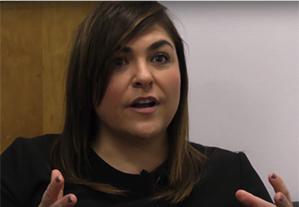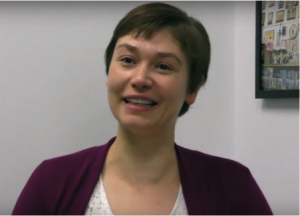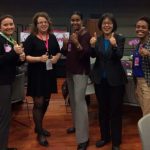The Network You Build from Campus to Career
he recent Silicon Valley Women in Engineering Conference (SVWiE) had an impressive lineup of speakers who candidly shared “campus to career” stories from their unique experiences. When I asked them “What advice would you be most likely to offer to college women today?” a common theme emerged. Namely, to be proactive in building a network of peers and mentors while in college.

Students in the WIE conference
It goes without saying that coursework comes first, and having a balance of social activities is healthy and fun. But if you are intentional about developing peer and mentoring networks, you will reap the benefits of friendship and wisdom for life.
In my 30 years of teaching and interacting with thousands of college students at major public universities, I’ve observed that students pay little or no attention to defining a career path until their senior year. Starting the job search process with graduation just around the corner can be frustrating and confusing when there’s been no path planned.
*Connect with your peers
It can be daunting to connect with peers when you’re one of 30,000 students on campus, and maybe one of 1,000 in your degree program. Beyond team projects in the classroom, seek out student organizations that reflect your interests. Don’t be afraid to be the one to break the ice. Be helpful when you can, and when you need help, ask others.

Erica Lockheimer
Erica Lockheimer, LinkedIn Senior Director of Engineering, had this to say at SVWiE conference: “If you have an interest, go find other people with the same interest and build a community. I was the first in my family going to college. I went to San Jose State University. When I first started, engineering was an interest, and I enjoyed math. I got into engineering because I figured those two go together. I didn’t have a lot of guidance. I wish I would have asked for help. Classes started getting really, really hard. I almost dropped out of school. [Someone] came up to me and said, “Hey do you need some help?” I said, “Yes.” Then I got into a computer club here at San Jose State. I met a whole bunch of people…building that community…we’d stay up until two in the morning, whiteboarding solutions, and then it became fun. Speaking 17 years [later], that’s how work is. It is a community, it is about building something together.”
*Seek out mentors
I’m often asked how to find mentors, especially in Silicon Valley where people are very busy. Before approaching professors and industry professionals in your field of interest, do a little homework on their backgrounds and accomplishments. Attending professional conferences provides a rare opportunity to meet in person, in a networking context. When you do make contact, find some common ground. Be clear about your interests and goals. The best mentors enjoy helping aspiring students. They may point out promising industry trends to help you evaluate educational and career choices with an eye toward the future. They will look for opportunities to connect you to career opportunities and encourage you to stretch beyond limits you may have imposed on yourself.

Leah McGuire
According to Leah McGuire – Lead Member of Technical Staff at Salesforce, “One of the things I wish I knew, when you are applying for a job, if you meet half the criteria that they list on a job, you should apply. If you meet all the criteria, you’re overqualified. So, just go for it. If it looks interesting, try your hand. You want a job that’s going to expand your horizons, not something you could do in your sleep. Find something that you are most of the way to or part of the way to and that gives you room to grow.”
*Nurture relationships
If the ball’s in your court, be proactive. Get to know people who have gone before you. Ask them about their pathway between academic to career pursuits. Take their advice seriously—follow through on it—and they’ll take you seriously. This is particularly true if you’re charting new territory, for example, as one of the first women in an emerging field.

Shellye Archambeau
Shellye Archambeau is Chief Executive Officer at MetricStream. Her advice for women in technology is solid: “As you look around, you’re not going to see a lot of women, which means it’s not necessarily the easiest thing, but it’s totally doable. Just look at what kinds of jobs you want, talk to people that are currently doing those jobs, and then figure out what experience you need, what roles you need to have, and go after it, and you can make it happen.”
Keep in mind that relationships are strongest when they are reciprocal. Don’t assume that your mentor considers herself too important to benefit from knowing you. Chances are that you remind her of an earlier time when someone mentored her, and now she’s glad to pay it forward. She might even have you in mind for a future spot in her team.
*CAWIT would like to acknowledge the women quoted in this blog for their inspiring presentations at the 2017 Silicon Valley Women in Engineering Conference. (Photo Credit: David Schmitz)






